
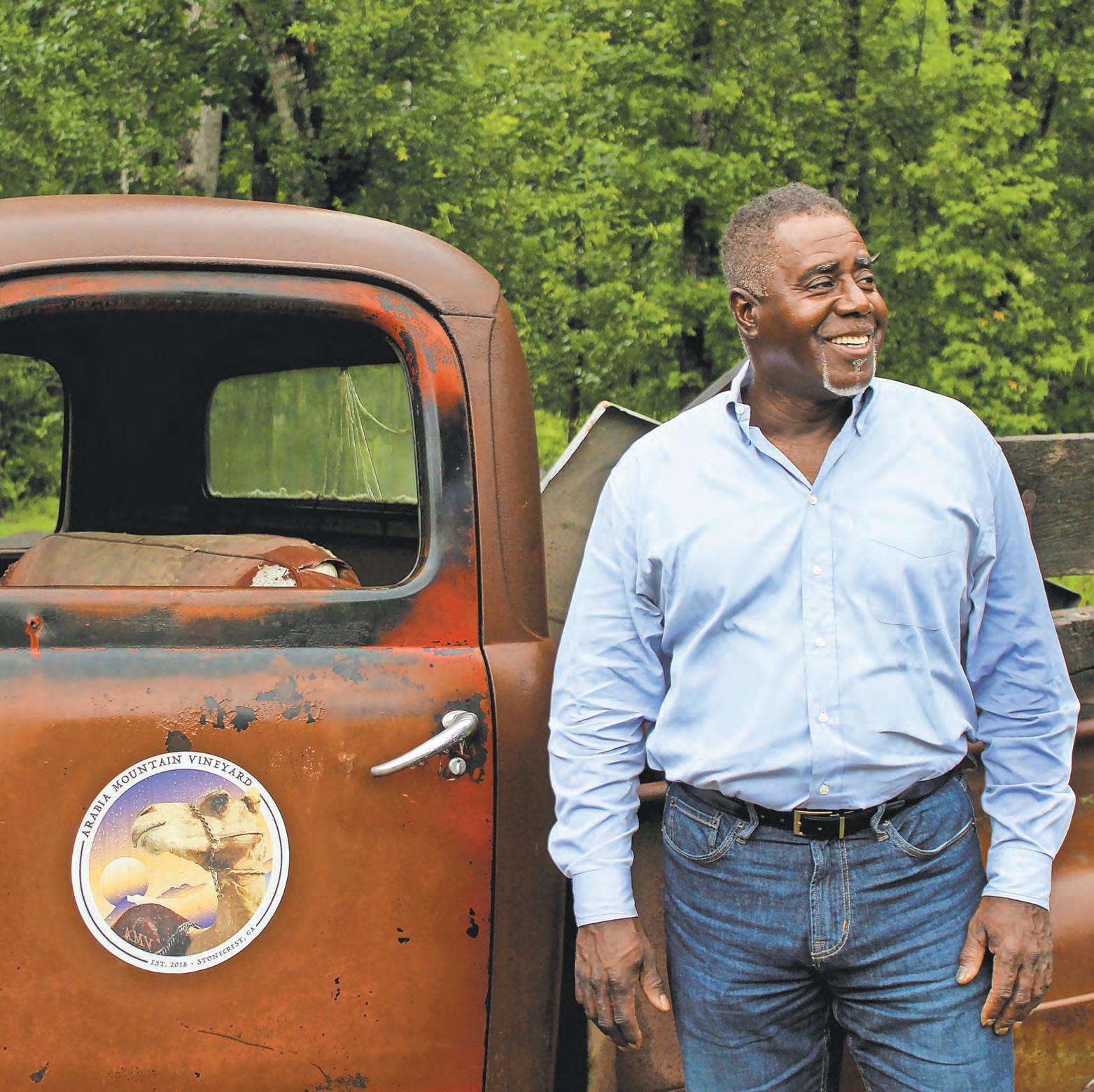



By LAURA NWOGU
Out of the more than 11,000 wineries in the U.S., fewer than 1% are Black-owned. Among that small number is Stonecrest’s Arabia Mountain Vineyard. The family-owned vineyard is nestled at the foot of the mountain where 18 ½ acres of sprawling land have been transformed into rolling hills and green valleys dotted with palm trees, natural streams, and a breathtaking landscape with panoramic views that is the home to the only wine grape vineyard in the metro Atlanta area.
It’s a labor of love that began over 30 years ago at the hands of CEO and founder Tim Starks. When he acquired the land, Starks initially intended for it just to be a tree farm, but he and his family have transformed it into a place that not only grows grapes but also a legacy for all.
Starks co-owns the vineyard with his sisters Cheryl Starks-Pickens and Marvis Starks-Zanders. His 80-year-old mother, Shirley Starks, aka Grandma Tiny, is often seen helping around the vineyard. So much so that her passion and hard work have been celebrated with a dedicated area at the highest point of the vineyard named “The Belvedere at Tiny’s Peak.”
“I want to do something that will leave some type of legacy for my family, and particularly my grandkids. So this, to some degree, is a legacy project,” Starks said.
Stepping onto the vineyard’s soil, it’s easy to see why people often describe wine as a bridge between individuals, culture, and the passage of time. Every bit of the vineyard is rooted in history and intentionality, with a purpose to provide tranquility and moments of joy with every step. From the pond and waterfall that gently stream between looming trees to the communal fire pit and the beginning stages of many other projects, Starks and his family are creating a haven for years to come.
Starks’ love for agriculture is far from new, and it’s a tradition that has been passed down through generations. As a child, he grew up


planted the first grape vines in 2020, opened the grounds for venue rental in 2024 and celebrated their second harvest festival along with the help of volunteers in the same year.
working on his grandmother’s farm and embraced his love for the outdoors throughout the years. He started his own contracting business at 21, became the first Black irrigation contractor in metro Atlanta, and later transitioned to a landscape contractor. It was years later, during an inspiring trip to Napa Valley, California, that the vision of Arabia Mountain Vineyard began to form.
He shared that he knew very little about vineyards and had never met any Black vineyard owners, but like many of the things he’s accomplished in life, he stepped out on faith.
The Starks family founded the vineyard in 2018,

Since the vineyard’s opening, Starks said the community has embraced the slice of paradise. For many Atlanta-area residents, visiting a vineyard requires a drive up to cities in North Georgia, but Starks wanted to create a home away from home in his own backyard. It’s a venture that he hopes opens the doors for more possibilities, especially for the Black and agricultural community.
“Folks have been so gracious and so kind. They thank me, especially young people, which initially, I was like for what? And they said, for creating this so we don’t have to go to other parts of the city. We don’t have to drive an hour and a half, two hours; it’s in our community, it’s in our neighborhood. It’s kind of a big deal. And also, just to see someone who looks like me doing it.
“Seeing how much the people enjoy it and appreciate it, that’s very rewarding. It allows me to utilize my gifts and talents, and agriculture is something that, for the most part, has died.”
Black farmers have historically been subjected to systemic racism and discrimination, losing more than 12 million acres of farmland due, in part, to discriminatory government policies and unfilled promises of land redistribution. In July, the USDA ended support for Black farmers, citing President Trump’s executive orders.
Arabia Mountain Vineyards is registered as a state farm. When Starks founded the vineyard, he said DeKalb County had to write new ordinances to allow the farm to exist because no more farms exist in the county. However, these challenges haven’t deterred Starks.
“It can lead to some frustrations, if you allow it. I don’t allow it,” Starks said. “We’ve
dealt with it for many years. We are a resilient people, and that’s why I think for a lot of us right now, it doesn’t move us at all. I’ve got a friend of mine and one of his sayings is, ‘There’s no hill to a high stepper.’ In other words, I’ve been here before. We’ll get past this just like we got past everything.”
Arabia Mountain Vineyard offers a variety of offerings, such as vineyard tours, wine tastings, couples experiences, and different events that promote wellness. The dedication poured into the vineyard and its guests that come down its gravel path is seen quite clear during these events as the family, especially the Starks sisters and Grandma Tiny, make every effort to ensure each and every guest is taken care of.
Starks’ vision for the vineyard is still a work in progress, with many construction plans in the works. In the next five years, he hopes to finish those plans, which include a dedicated building for a winery, a cafe, a stage for live performances, tucked-away cabins for overnight bookings, and a greenhouse. Starks also sells his five varieties of wine grapes to other Georgia winemakers and plans to create their own bottles in the future.
Starks hopes that Arabia Mountain Vineyard will further promote diversity in the wine industry and strengthen the community.
“What I hope to do is to encourage others. If not to follow this dream, then whatever dream, but to be an example of that. I do hope that others will follow suit, and we can create a community like they have in North Georgia. There is some value to the community, and that’s why I said I hope that others will buy into it and maybe do the same thing.
“I’m not doing this because there are no others. I’m just doing it because this is what I desire to do.”
By ISAIAH SINGLETON
The GLOBE Academy, a free dual language immersion public charter school in DeKalb County, unveiled its new lower campus in Decatur.
The Decide DeKalb Development Authority board voted to aid the GLOBE Academy secure a $25 million bond to buy and upgrade the new lower campus back in July 2023, and now it is finally open.
The academy debuted the new campus just in time for the beginning of the upcoming school year. They will welcome Kindergarten through fourth-grade students on August 6th, and fifth-grade students will move to the new campus in 2026.
The new 7.5-acre property allows GLOBE to combine grades K-5 on one campus and free up space for meaningful growth at its Upper Campus, located on Briarcliff Road, which will become GLOBE Middle.
Established in 2013, the GLOBE Academy, or Global Learning Opportunities through Balanced Education, offers placement for kindergarten through eighth-grade students via random lottery or proficiency tests, depending on grade level.
With a focus on a dual-language immersion, an experimental-learning model and a constructivist approach, GLOBE inspires students to be high-performing lifelong learners equipped to make a positive impact on the world.
Additionally, the academy has a student enrollment of approximately 1,200 students, a dual-language model that features French, Chinese, Mandarin, and Spanish.
Christi Elliot-Earby, executive director of the GLOBE Academy, said the transition from their former location was needed.
“We knew we needed a new building. We

were in a DeKalb County School District building that was literally crumbling underneath our feet,” she said. “2022 is when we first got the call where this idea turned into what you saw today.”
Elliot-Earby also said they weren’t exactly sure where the facility would be located, so with the help of the Claremont Presbyterian Church, who owned the property of the new location, the lower campus found a new home.
“I don’t think they wanted to sell it to a developer, so they wanted to either find a school or another church, and they chose us, and we were able to buy these two buildings and all the land behind,” she said.
She also said the new building is what she has been looking forward to once the new school year starts.
“I know it sounds funny, but this building feels like a real school, and I feel like we finally made it,” she said. “We did it because
there’s a lot of private and charter schools that struggle within that first 10-year period, some close and some don’t make it, but we did, so it’s just a great feeling.”
Also, despite the new building, Elliot-Earby says budget constraints led to the gym lacking air conditioning, prompting a capital campaign to raise funds for this improvement.
The GLOBE Academy lower campus is at 1985 Azalea Circle, Decatur.
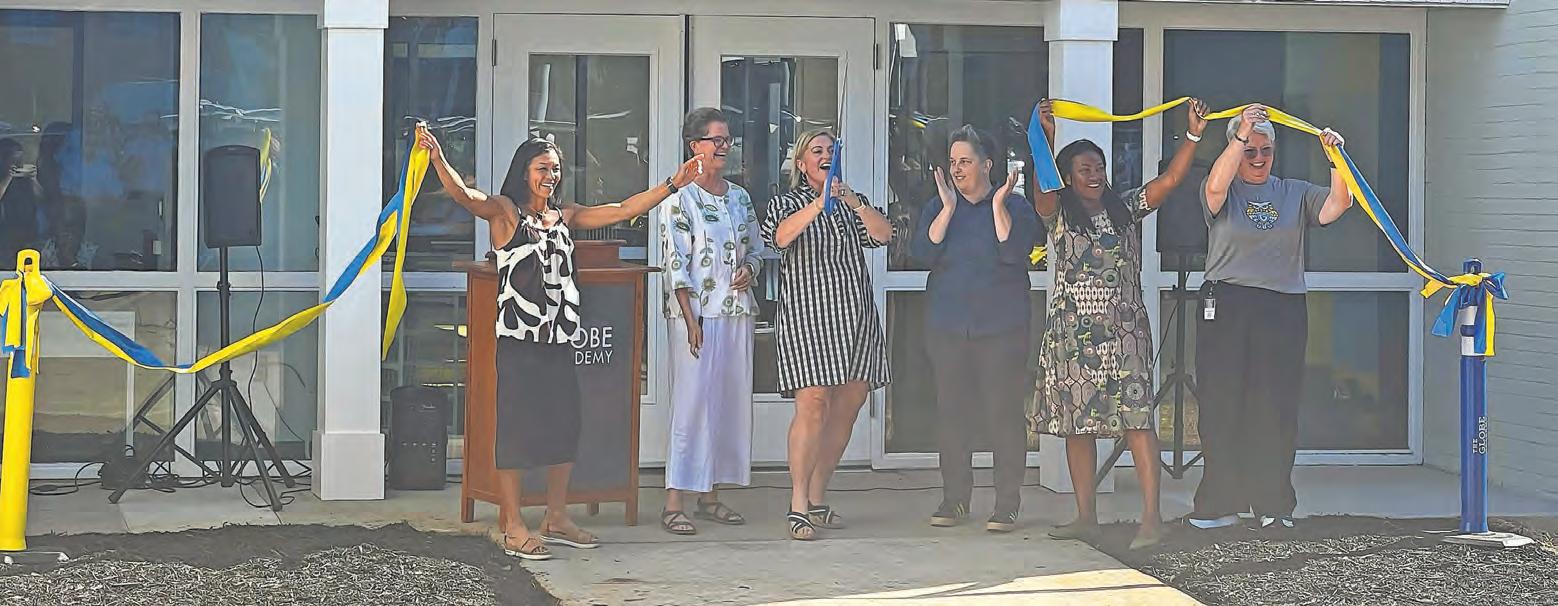
By KEITH B. SHOATES
Higher education is at a crossroads. While college is still seen as a ladder to economic mobility, for too many — especially Black students — it has become a trap of student loan debt without degrees. Nearly 17% of all college students take on loans but never graduate. Among borrowers, that number rises to 40%. Nowhere is this failure more visible — and more devastating — than at our nation’s Historically Black Colleges and Universities (HBCUs).
For generations, HBCUs have done more with less. Despite meager and oftentimes insufficient budgets and systemic underfunding, these institutions have produced 80% of Black judges, 50% of Black lawyers, and nearly half of all Black engineers and educators. They are the beating heart of many communities, economic engines, and vital contributors to national prosperity.
As president and CEO of Student Freedom Initiative (SFI), I know from firsthand experience that the solution is not in a policy paper — it’s in the mirror. We already have the power, the talent, and the infrastructure to transform the future of HBCUs and their students. What’s needed is the will — and the collective action.
SFI works to bridge the resource gap at HBCUs through innovative, student-centric solutions. Our flexible funding alternative to Parent PLUS loans eliminates credit checks, co-signers, origination fees, and requires no repayment if income falls below 300% of the federal poverty level. It features interest rates 2% lower than Parent PLUS loans, and repayments that are recycled for the benefit of future eligible students.
But we go further. We’re helping HBCUs expand capacity with affordable student housing, workforce development housing, workforce development programs that include stackable credentials to allow students to enter/leave the traditional post-secondary environments on a schedule that works for their unique lifestyle, and upgraded cybersecurity infrastructure. Our mission is simple: to empower students to succeed on their terms, unburdened by structural or financial constraints.
We know what’s coming. History tells us: if we wait for someone else to save our institutions, we’ll be waiting forever. That’s why I’m calling on HBCU alumni, fraternity brothers and sisters, corporate leaders, entertainers, athletes, and anyone who values Black excellence to take ownership of this moment.
We already have the blueprint. At SFI, we’ve built an infrastructure that ensures impactful, transparent allocation of resources. We understand not just the budgets and balance sheets of HBCUs, but the culture, the history, and the heartbeat behind each campus. With the right coalition, capital, and commitment, success isn’t just aspirational— it’s inevitable.
This isn’t about one-time donations. It’s about

sustained investment, strategic collaboration, and reclaiming our agency. Lasting change comes when philanthropy, private industry, and community organizations align with mission-driven leadership at HBCUs.
Robert F. Smith’s historic 2019 gift to Morehouse College erased student debt and ignited a global dialogue on communal responsibility. Others followed — Reed Hastings, Oprah Winfrey, Michael Bloomberg, MacKenzie Scott, Beyoncé Knowles-Carter, Myles Garrett, and many more. But the true power lies not in celebrity alone. Each of us can be the catalyst for change. Each of us can be a philanthropist within our communities for those constituents that matter to us. What matters to SFI is our HBCU-anchored communities.
Now is the time to institutionalize that energy. To support SFI, UNCF, Thurgood Marshall College Fund, National Association for Equal Opportunity in Higher Education, and other nonprofits on the front lines of HBCU advancement. To ensure these schools are no longer forced to choose between renovating aging buildings, funding scholarships, or expanding academic programs.
We must enable HBCUs to say “yes” to the future: “yes” to mental health services, modern laboratories, broadband internet, and industry-aligned curricula. This is how we turn the tide — not just for institutions, but for the generations they empower.
The transformation of our HBCUs won’t be led by policymakers or pundits. It will be led by us — by CEOs and cultural icons, tech founders and Grammy winners, panhellenic council members, alumni, and advocates who choose to act. Collectively, we are more than enough to lead this transformation.
With thoughtful stewardship, our collective investment can reshape the HBCU ecosystem for generations to come. But only if we stop waiting for help to arrive from somewhere else.
The time is now. The solution we seek is in the mirror — and the mirror is waiting.
Keith B. Shoates is the President and Chief Executive Officer of Student Freedom Initiative, the organization founded following Robert F. Smith’s transformational gift to the 400-member Morehouse Class of 2019. SFI’s mission is to increase students’ access to education without crushing student debt. Learn more at studentfreedominitiative.org
FOUNDED May 11, 1966
FOUNDER/EDITOR
Ed Clayton Immortalis Memoria
PUBLISHER/EDITOR
J. Lowell Ware
Immortalis Memoria
The Atlanta Voice honors the life of J. Lowell Ware.
PUBLISHER
Janis Ware
PRESIDENT/
GENERAL MANAGER
James A. Washington 2018-2024
EXECUTIVE ASSISTANT TO PUBLISHER
Chia Suggs csuggs@theatlantavoice.com
EDITOR IN CHIEF Donnell Suggs editor@theatlantavoice.com
GENERAL ASSIGNMENT REPORTERS
Isaiah Singleton isingleton@theatlantavoice.com
Laura Nwogu lnwogu@theatlantavoice.com
BUSINESS REPORTER Tabius McCoy tmccoy@theatlantavoice.com
EDITOR AT LARGE Stan Washington swashington@theatlantavoice.com
ADVERTISING, SALES & CIRCULATION
ADVERTISING ADMINISTRATOR
Chia Suggs advertising@theatlantavoice.com
SALES
RDW Jackson rdwadman@gmail.com
CIRCULATION MANAGER Terry Milliner SUBMISSIONS editor@theatlantavoice.com
DIRECTOR OF PUBLIC RELATIONS
Martel Sharpe msharpe@theatlantavoice.com
CONTACT INFORMATION 633 Pryor Street, S.W. Atlanta, GA 30312
Office: 404-524-6426 info@theatlantavoice.com


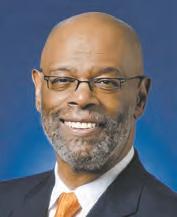
BY JAMES A. WASHINGTON
The Atlanta Voice
I saw something the other day that made me stop and think. “Jesus, Revolutionary!” It’s not the first time I’ve had the thought, and I believe I’ve written about it in the past. But what made this different was my understanding, or lack thereof, about just how radical Jesus was. What prompted the pause this time had to do with what we consider today revolutionary and what revolutionary might mean in terms of Christ today. More importantly, this made me think of revolution in terms of me and my faith walk. I mean a core teaching principle about life and death and the life of Jesus Chris is that He focused on substance, not style. We have come to know through Jesus that the outward act of prayer has little to do with the internal purpose of prayer. The literal and technical interpretation of God’s laws has little value if not filtered through the intent of God’s will.
Jesus was executed because He challenged the rigid practice of the intellectual/literal enforcement of rules and regulations. He was crucified because He asked of those in charge, “Where’s the love and compassion in what you
“Where’s the love and compassion in what you do?”
do?” To Jesus, the church hierarchy had little to do with the church’s purpose, and He challenged the hierarchy to forego practice for the purpose. As a follower of Christ, then, is it for a purpose? It is not our duty to be just as vigilant against law and o r d e r in today’s church. Shouldn’t we be concerned and active in the church that Jesus left behind? Are we about doctrine or duty? See, this is where that revolutionary stuff comes up. Duty based on faith and belief in the Almighty demands a particular action. Doctrine demands little more than an external demonstration of understanding the rules. Does that make it revolutionary to question the intent and effectiveness of, say, a church’s Outreach Ministry instead of the choir’s budget? Does Jesus’ message demand that we reorder our thinking to go beyond church walls and deal with those we would otherwise think we’re

better than, because we go to church every Sunday at the same time, in the same place, in the same seat?
A Sunday seat doesn’t necessarily mean a Sunday heart. Does this sound revolutionary to you? When you break it all down, the revolutionary part gets exposed when you look at who Jesus helped. When you look at the targets for the miracles, they were at times the lame and the lost, the poor and the blind, the wretched and the vile. Jesus Himself didn’t even fit the mold of who the church wanted to call King. He wasn’t kingly enough by the church’s interpretation of the rules and regulations, the definition of the king that it wanted. Jesus hung out with the wrong crowd, doing some terrible stuff, preaching some of the wall doctrine. Yeah, when He talked about forgiveness, that meant you being the forgiver, not the forgiven. The love He spoke about was that which
you give, not that which you receive. The same held for mercy and charity. I guess this was enough to get Him killed. The strange truth is that nothing will happen to you if you preach these principles today. If you practice these truths, you might fall prey to jealousy, envy, gossip, and death. You know you’re a revolutionary if anybody notices you challenging the status quo to do God’s will. Is anybody paying any attention to you these days? Let’s hope so, at least that Satan is. Let’s hope he’s heard of you doing things in the name of the Lord. May God bless you and give you the strength to be His revolutionary today, in your chosen church.
This column is from James Washington’s Spiritually Speaking: Reflections for and from a New Christian. You can purchase this enlightening book on Amazon and start your journey toward spiritual enlightenment.


By LAURA NWOGU
Several business owners and community members in the Cascade Heights neighborhood held a meeting on Tuesday afternoon to air their grievances and demand accountability from the City of Atlanta regarding prolonged construction along Cascade Road. Sheltered under tents outside of MoreLyfe Juice Co., the business owners shared the negative impact the construction has had on their businesses, citing loss of customers, money, and trust in the city.
Cascade Road Complete Street project, which began Phase I construction in 2023 after a two-year delay, aims to improve safety and walkability. Construction starts at the intersection of Cascade and I-20, with its impact reaching the West End near Ralph David Abernathy. However, it has been plagued by delays, causing disappointment and anger from community members who have lived, shopped, and created opportunities and businesses in the area. A project that the community said they were told would take one year has stretched into two years. From detours and narrowed lanes along the busy southwest Atlanta corridor, community members lamented the unfulfilled promises and lack of communication and transparency from the city and demanded an economic recovery plan.
Trinket Lewis, owner of MoreLyfe Juice, and Courtney Rucker, co-owner of Southern comfort restaurant Natalia Bianca, were among the speakers at the meeting. They shared how their sales have decreased exponentially and how many customers are unaware that they’re open during construction. Ambassador Andrew Young, civil rights leader and former Mayor of Atlanta, also

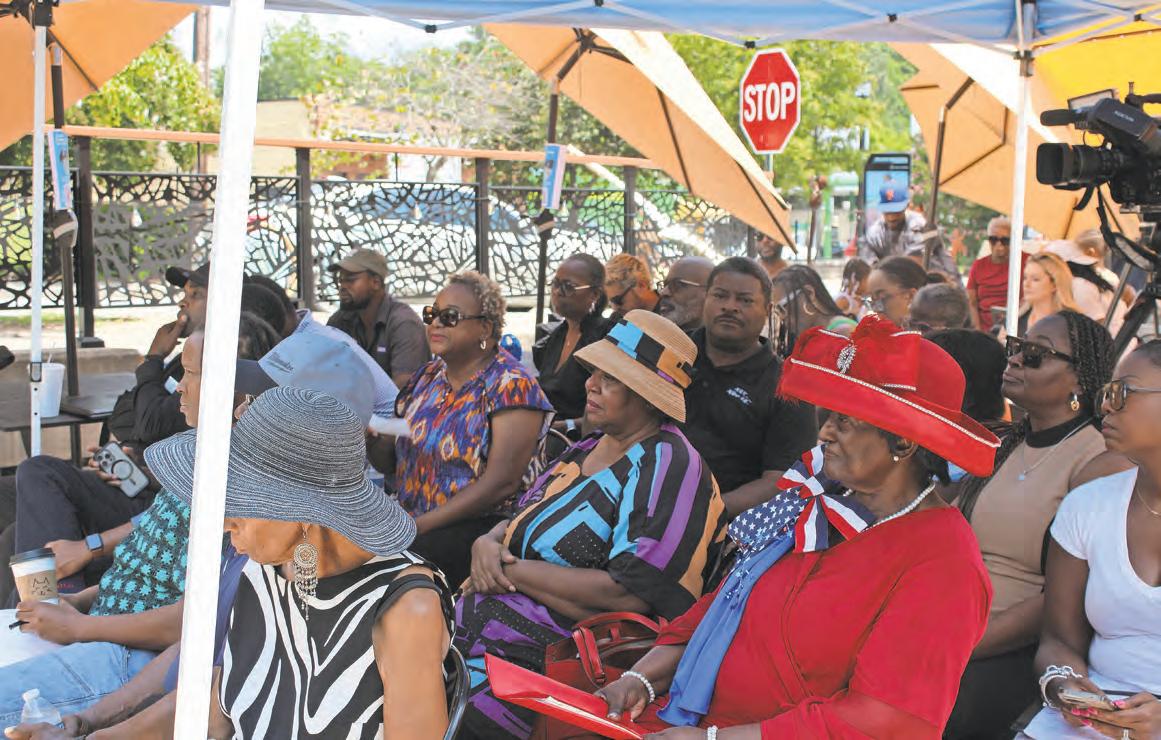
attended the meeting to address the issues impacting the historic neighborhood.
“I’ve lived in this neighborhood since 1966, and we’ve had struggles, but we’ve always kind of bounced back and kept on rolling,” Young said. “I am afraid that we have not done what needs to be done for our community, and I don’t know whose fault it is, but I’m glad to see us together, and let me know what you need me to do.”
Trent Floyd owns and operates several units in the J.R. Crickets Brand restaurant group and has lived in Cascade Heights for over 40 years. He opened a new J.R. Crickets location on Cascade Road in January 2023, which he said opened to rave reviews and enthusiasm from the community and strengthened his belief that J.R. Crickets would become a staple for another Atlanta neighborhood. However, when the construction project started, that belief was affected.
“I’ve invested over a million dollars into that vision, creating new jobs, creating a quality dining experience, and offering a space for our community to gather. Unfortunately, that momentum came to a screeching halt when the city of Atlanta blocked both sides of Cascade Road. It became nearly impossible for our customers to access the restaurant, especially during the lunch hour,” Floyd said. “Now, two years later, the city still has
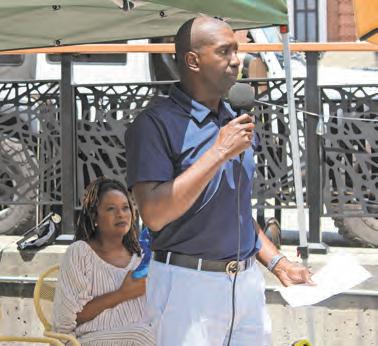
used the cities of Buckhead and Midtown as stark contrasts, citing situations such as the water main break in 2024, when businesses were offered $7.5 million in relief money to offset disruptions.
Rodney Mullins, a local grassroots organizer and former congressional appointee in the Obama administration, said Cascade Heights deserves the same respect. Many businesses are struggling to survive, and Cascade Heights business owners are asking the City of Atlanta for assistance.
one of those access points blocked on the 285 side. The road closures have cut us off from vital lunch traffic coming from 285, which is critical for all the businesses in this corridor and the churches.”
Many of the businesses along the corridor are small Black-owned businesses. Owners said they have lost thousands of dollars with little support from Invest Atlanta, the city’s economic development authority. They shared that they were offered loans with qualifications and partial forgiveness. They
“These businesses have struggled for over 300 days. They’re struggling with an infrastructure issue. Water main break, street closures — that’s infrastructure,” Mullins said. “They’re not asking for anything complicated. They’re asking for equity. They’re asking for respect. They’re requesting recognition, and they want results.”
Mullins listed out demands which included:
• A clearly defined and delineated financial investment in the community and businesses
• A time frame for when the construction will end.
• Technical support
• A comprehensive economic plan that includes Cascade in the tourism and economic development of Atlanta
By TABIUS McCOy Report for America Corp
Reeka Reek, the owner and founder of Kroonz Wear, a handmade hat company known for its one-of-one styles, has a unique style all her own.
“I actually hate being in a box. I’m extremely claustrophobic,” said Reek.
Kroonz Wear features a wide range of designs and color palettes from brimless hats to denim tallbrimmed top hats, cork-textured bucket hats, and oversized leather berets. Each hat is hand-sewn and designed by Reek herself.
And well… the eclectic outfit worn by Reek is one that’s a bit difficult to compartmentalize. She wears gold jewelry around her neck that catches the light with a bright shine, and her hands are filled with gold wire-made rings. Her bright orange oversized glasses pop out to the naked eye. Her one-of-a-kind earrings are made entirely of neon
orange and green yarn, slightly covered by her ginger-colored locs. At the top of her head rests a cloth hat sewn together from magenta, green, and orange fabric, which she made herself.
“The hat I’m wearing was actually influenced by the guy from Fat Albert,” said Reek, as the brim naturally fell over her eyes.
She was referring to the Dumb Donald character from the iconic 19070’s cartoon series.
From a young age, the Atlanta-based milliner was drawn to the expression of hats.
“I would go through my nana’s wardrobe and pick out some of her church hats, then go ride my bike in them,” said Reek. “As empowering as she appeared, wearing them was as empowering as I felt playing in her clothes.”
A product of a military household, Reek says moving to places like Germany, Oklahoma, and Tennessee shaped her creative eye.
“I was definitely always different

because I had so much influence— based on my environment, my travel, my experience in life—being a military brat,” she said.
Constant exposure to different cultures and styles as a kid expanded her view of fashion.
In 2017, Reek started Kroonz Wear after making a kofi for a client’s child using leftover fabric. “They loved it,” she said. Shortly after, she began taking custom orders.
Since then, Kroonz has been featured in publications like GQ and

Esquire, and worn by notable figures including Fareedah of Arrested Development and bass player Pastor Funk.
Many of the hats in the Kroonz Wear collection are cylindrical in shape. Reek attributed the design to her African heritage and the symbolism of crowns in African history. She wants people to feel empowered when they wear her hats.
“Like, they literally shift their whole body and their stance,” she said. “It’s like they’re at a chiropractor.”
Kroonz Wear hats are available at the brand’s booth inside Citizens Supply at Ponce City Market or online at kroonzwearco.com.


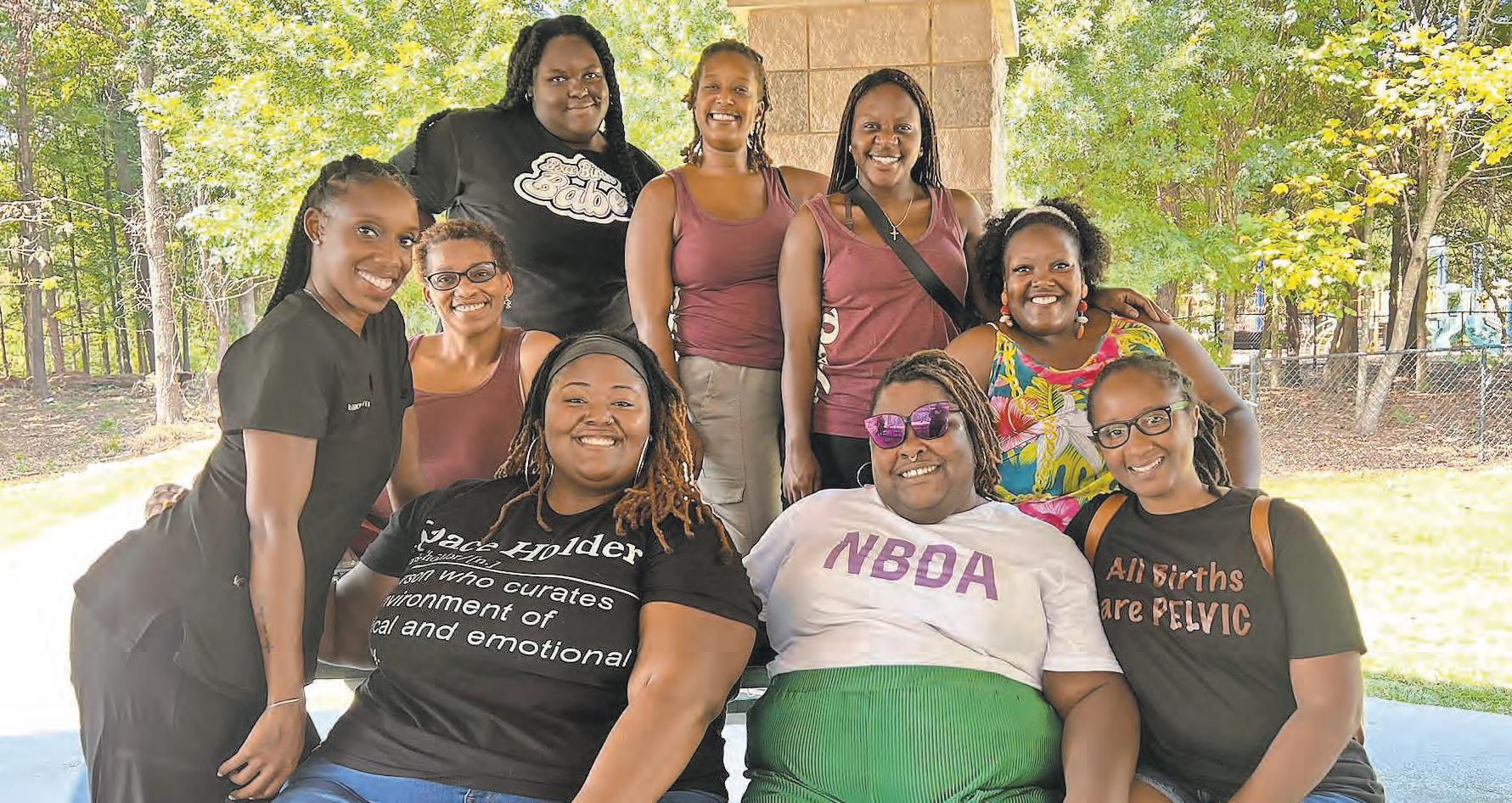

By GRACE BARLOW, DTU INTERN
As Black Breastfeeding Week approaches, the National Black Doulas Association (NBDA) is preparing to host its annual event, Chocolate Milk & Cookies: A Black Breastfeeding Week Celebration on Saturday, August 23rd, from 11 a.m. to 3 p.m. in Norcross, Georgia. The celebration is part of a broader mission to combat maternal and infant mortality rates within Black and Brown communities through culturally centered doula support, education, and advocacy.
The National Black Doulas Association, founded in 2017, stands as the #1 Black and BIPOC doula directory and training organization in the world. Their mission is urgent: Black women in the United States are three to four times more likely to die from pregnancy-related complications than white women, according to the Centers for Disease Control and Prevention (CDC, 2023). Increased access to doulas has been linked to improved birth outcomes, higher breastfeeding rates, and reduced cesarean births, key goals NBDA strives to achieve.
“Having a Black National Doula Association is meeting a need,” said Joy Johnson, Programs Director at NBDA. “One thing that will be different … from any training you’ll get as a birth doula, is that we touch on the history. We talk about our granny midwives … the historic racism in the healthcare system towards Black women.”
“They have left a legacy for us to be able to do the work that we do today,” she added, emphasizing the lineage of resistance and care that Black doulas continue to uphold.
The Chocolate Milk & Cookies event will serve as a family-centered gathering that brings NBDA’s mission into action.
“It’s a time for us to recognize the unique barriers and strengths in Black and brown breastfeeding communities,” said Johnson. “Whether you’re breastfeeding, bottle feeding, formula feeding, or just looking for a space to connect with other families, this event is for you.”
At the core of the event is a mission to address the disparities in infant mortality rates.
“The heart of this event is to combat the statistic that our Black and Brown infants are two to three times more likely to die before their
first birthday than their white counterparts,” Johnson said. “We want to make sure that it is known that our babies are loved, and that there is a safe space for them.”
In addition to celebration and support, Chocolate Milk & Cookies is an educational opportunity for parents, caregivers, and allies alike.
“One misconception about Black breastfeeding is that fact that Black women don’t breastfeed, or can’t breastfeed,” Johnson noted. “We [Black Women] are capable of that being a beautiful journey. It doesn’t have to be something that’s looked at as hard.”
From training birth workers to hosting community events, NBDA is committed to breaking stigmas and building trust within Black and Brown birthing communities.
“Our purpose is to educate our community, educate our white counterparts, educate our Black Doulas, making sure they’re given that culturally competent care,” Johnson said.
As families gather in Norcross this August, Chocolate Milk & Cookies will offer groundbreaking information and a powerful message: that Black births, Black babies, and Black breastfeeding journeys matter.
By NOAH WASHINGTON
The sounds of Africa echoed through the halls of Tri-Cities High School this weekend as dancers and drummers from across the continent gathered for the 16th Annual Atlanta African Dance and Drum Festival, a three-day celebration of the region’s culture.
The festival, which ran from Friday, July 25, to Sunday, July 26, featured workshops led by instructors from Guinea, Mali, Senegal, Ivory Coast, and Angola, drawing both seasoned performers and newcomers to African traditions. The festival was founded 17 years ago by Aiyetoro Frazier of the Afrikan Djeli Cultural Institute.
“I started this just to provide an opportunity for drummers and dancers to expand their learning, provide a chance for people to witness production,” said Frazier, who has put on the festival every year except for 2020 due to COVID-19. “It was an extension of a space that I had, where we had various classes. Then, beyond just offering classes for local students, we also wanted to do something to offer people who could travel as well.”
Among the featured instructors is Djeneba Sako, 57, a Mali native who has become a fixture at the festival since first attending in 2003. Sako, who originally came to the United States in July 2000 to teach at the University of Colorado Boulder, now travels annually from Colorado to lead workshops in traditional Malian dance.
“I bring my culture to share with
everybody here,” said Sako, who demonstrated the “Didadi” dance during Friday’s activities. The traditional dance, she explained, is performed at ceremonies throughout the Wassoulou region of Mali and holds special significance for its emotional healing properties.
“Didadi is a sweet dance,” Sako said. “If you’re dancing or you’re playing, you’ll be happy. If you are angry, you forget you’re angry; if you have a lot of things on your mind, you’ll forget. You’ll be happy.”
The festival’s programming includes intensive workshops from 10 a.m. to 6:30 p.m. Saturday and Sunday, following Friday’s opening night signature Midnight Dance Workshop. Participants can choose from various skill levels, with master instructors providing hands-on training in traditional movements, rhythms and cultural context.
Saturday evening’s highlight features a concert performance of “The Goddess Zaouli Lives” by the Afriky Lolo West African Dance Company from St. Louis. The production, under the artistic direction of Diadié Bathily and choreographed by Bathily and Rokya Ouattara, tells the story of Zaouli Djèla Lou, a young woman whose trials of love, betrayal and redemption unfold through drumming and dance.
“It’s very good to see people enjoying themselves,” Frazier said.
“It’s good to hear the comments that they’re making about how much they’re learning, how much they enjoy the teacher, how much they enjoy the music.”
The festival also features an
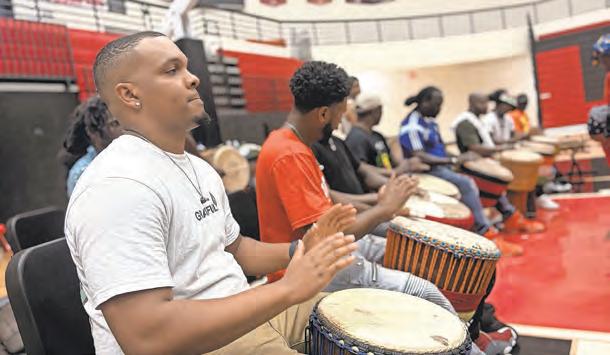
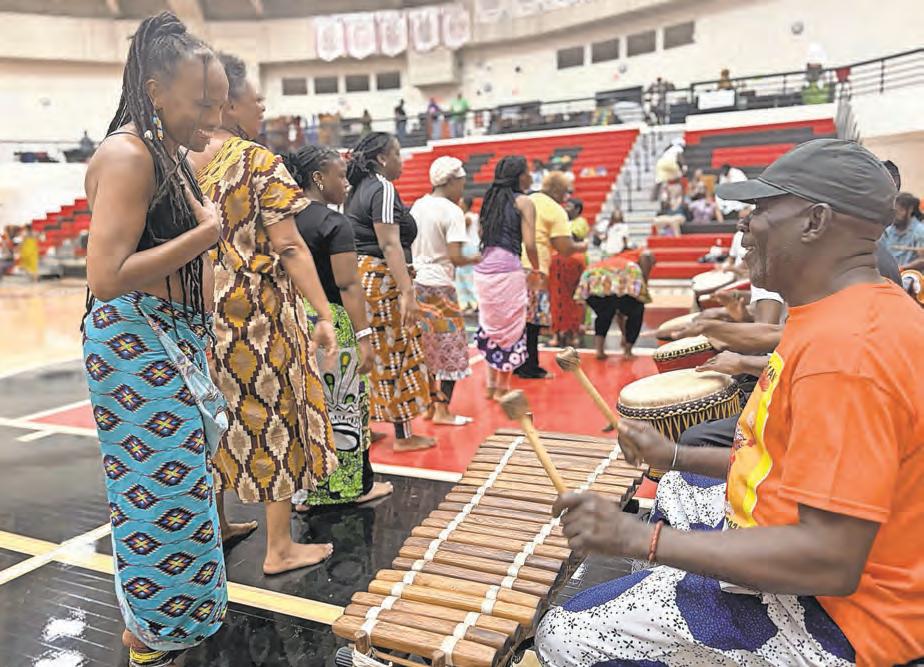

African-inspired marketplace with handcrafted goods, traditional clothing, instruments, and food vendors that is free and open to the public, creating an accessible entry point for community members to experience the celebration.
For many instructors like Sako, who teaches weekly community classes in Boulder and performs at weddings, baby shower,s and cultural events, the festival represents an annual homecoming of sorts. Her connection to the festival’s community spans more than two decades.
“I would say, on a real basic level, leave at least one or two steps that the teachers taught,” Frazier said of his hopes for participants. “If they took a drum class, at least leave with some parts of some of the rhythms that they learned. Leave with a sense of family. Leave with a feeling of culture and community.”
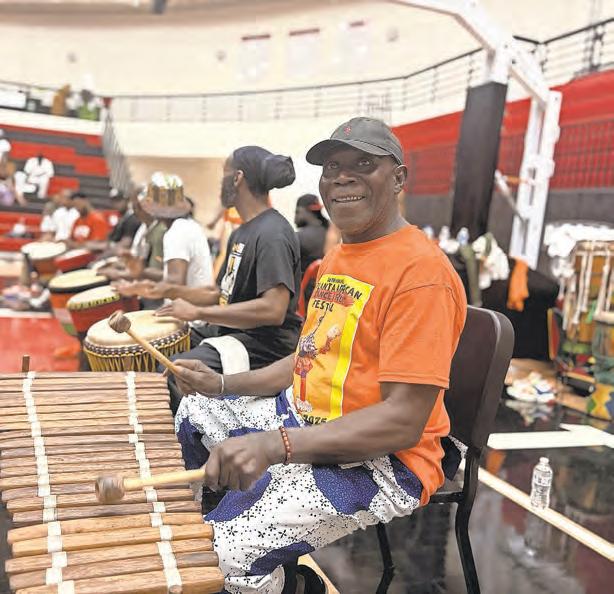
By TABIUS McCOy Report for America Corp
“Ilisten to you before all my games,” says a young boy as he runs up to the Atlanta-born rapper whose music has been streamed over 30 billion times globally. His young voice is filled with ebullience.
“What type of shoes he got on?” another kid whispers to his friend, surprised that the Grammy-winning artist kept it classic and simple with a pair of all-white Air Force Ones.
“Aye Lil Baby, can I get a picture?” a group of kids calls out. Lil Baby quickly invites them in. “Yeah, come on,” he says, pulling them in for a quick flick—just like he’s done multiple times today while calmly moving through a crowd of thousands.
4,000 attended Lil Baby’s fifth annual back-to-school bash in the West End on Saturday afternoon, hosted by him and his non-profit, The Jones Project. The event provided children with free shoes, book bags filled with school supplies, wellness products, and free food.
As Lil Baby made his entrance shortly after the event began, boys and girls of all ages ran up to him, pulling out their phones for selfies and videos. He stopped and took time to pose with each one.
“I love them like they love me,” said Lil
Baby when asked about the overwhelming support from those at the event.
“Lil Baby, Dominique, keep doing what you are doing—we love you for that,” said Yolanda Hill, a parent in attendance. “A lot of artists just throw money and don’t really come to these types of events, but he came and actually stayed and showed face.”
Despite his global fame, the artist consistently pays homage and respect to the community he grew up in, the West End—often crediting the neighborhood in his discography and regularly giving back, not just for back-to-school events but throughout the year.
“It means a lot to be able to come back and give back, because I know so much comes behind not having shoes and school utensils and stuff for school—because that be a lot of kids’ reason to steer off,” the artist told The Atlanta Voice
The event was produced in partnership with the Jessie Rose Project, The Athlete’s Foot, Slim & Huskies, Zaxby’s, Fanatics, and Dr. Bombay Ice Cream.
The kids also received free haircuts, braiding services, and carnival rides and games.
The event served students from kindergarten through 12th grade across metro Atlanta schools.
“To know that the parents don’t have to stress about this part makes me feel good,” said Lil Baby.
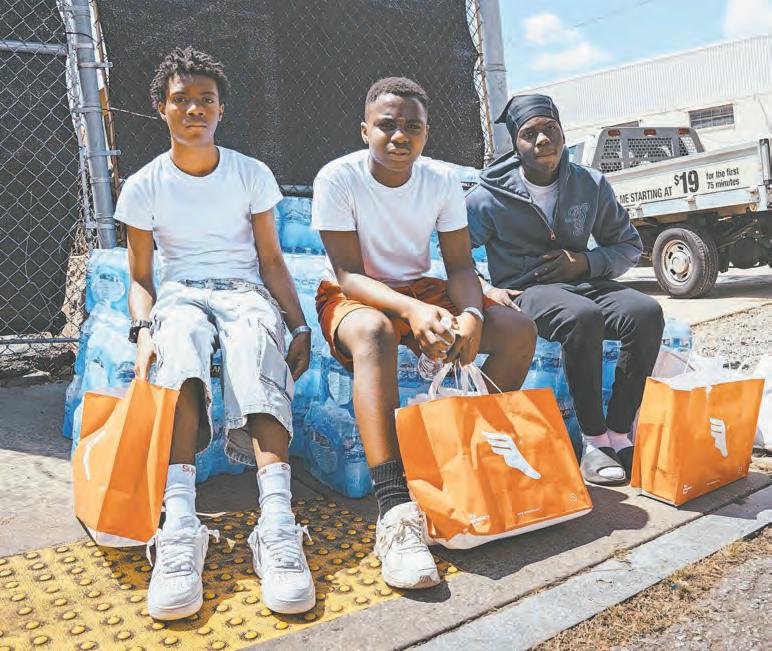

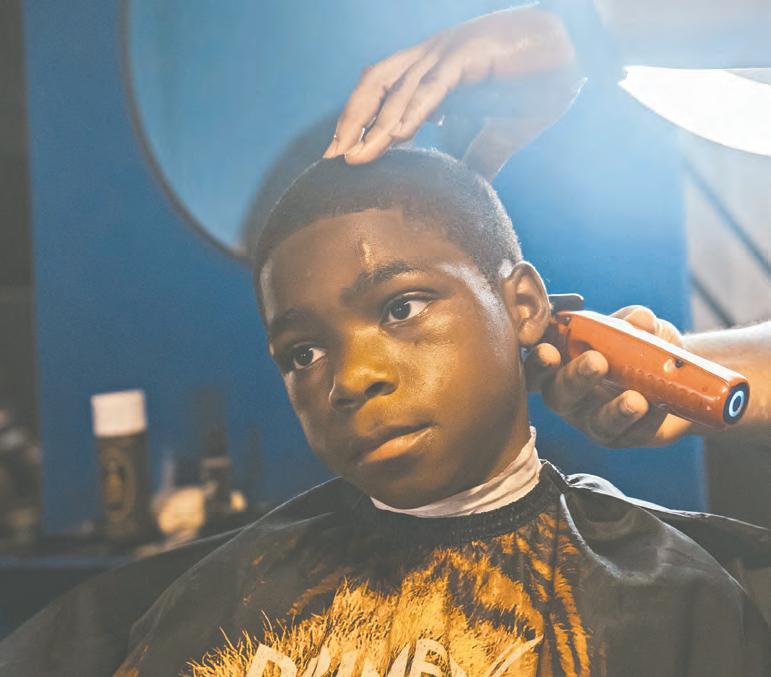
By DONNELL SUGGS
FLOWERY BRANCH,
GA - The Atlanta Falcons are back in training camp. Beginning on Thursday morning and running through the next three weeks, the Falcons are setting out to end a streak of deficiency. Atlanta hasn’t made the playoffs since Matt Ryan was well into his multiple Pro Bowl and future Pro Football Hall of Fame career. Now retired and a studio analyst for CBS, Ryan and his twin sons walked around the sidelines during training camp on Sunday.
The gates at IBM Performance Field opened, and a sold-out crowd made their way inside to see the 2025 Falcons practice. In fact, all three days of open practice during the first week of training camp were sold out, according to the team. The hill near the practice field was packed with fans watching, cheering, and occasionally oohing and aaahing when certain players made plays during drills on Thursday, Saturday, and Sunday of last week.
The expectations for the franchise haven’t been this high for nearly a decade. In fact, it’s been almost as long as the Falcons’ current postseason drought, seven years. To be excited to watch a team that hasn’t made the playoffs in seven years must mean something’s up.
The dream of returning to the playoffs, and maybe even the Super Bowl for the third time in franchise history, begins anew.
Falcons all-pro safety Jessie Bates III talked to the media after practice, and I asked him what it would mean to end the streak and help the Falcons return to the postseason. Bates III said a playoff berth would mean a lot to more than just the team’s players.
“It’s been a while, this is this is my third year going into it,” Bates III said. “Year one, we didn’t get into the playoffs. Year two, we were right there. Now it’s year three, and we reset again. I always think about that, I always think about how we can get to the playoffs. When we get to the playoffs, good things happen for everybody in this building.”
Falcons kicker Younghoe Koo, a fan favorite over the years and one of the most clutch kickers in the National Football League, said making the playoffs could solve a lot of problems.
“As a young player, coaches used to tell me that winning cures all,” Koo said. “That’s kind of the case in this business. We just have to do it.”
Second-year Falcons head coach Raheem Morris has a lot to do with those high expectations and will play a large part in whether this team wins or not. Morris and his staff, which now includes a new defensive coordinator, helped lead the team to eight wins during the 2024 season. That’s nothing to sneeze at, considering the Falcons went 7-10 for three consecutive seasons prior to 2024. With a full season under his belt, Morris has a roster that’s better equipped to add a couple more wins to the tally. The Falcons’ defense, particularly the front
seven, will have to play much better if the team is going to win the NFC South or grab one of the wild-card spots.
Defensive line coach Nate Ollie said the staff loves the guys the team has in the d-line room.
“The defensive line is the engine of what we are trying to do,” Ollie said. “Every time we are watching that tape, I want to see guys repping our style, that’s getting off on the football, that’s attacking, and that’s running in a dark room.”
If the quarterback position remains the high mark for a successful franchise. Enter: Michael Penix, Jr.
On Thursday, Penix, Jr. looked sharp, but more importantly, he looked like the QB1 is supposed to look. On Sunday morning, day five of training camp, Penix looked equally as sharp during offense/defense run-throughs. Deep throws to Ray-Ray McCloud III and Drake London looked ready for gameday Sundays.
His backup this season, former starter Kirk Cousins, looked less sharp on his throws. Cousins is coming into the 2025 season in a position he hasn’t been in since his rookie year. Falcons general manager Terry Fontenot says, despite no longer being QB1 for the Falcons, Cousins has been a positive presence in camp.
“Kirk has been the ultimate professional,” Fonetnot said to a room full of reporters. “He shows up and does his job.”
Back for his sophomore season, Penix may only have three starts on his resume (two were losses, and the only win came over the New York Giants, the second-worst team in the NFL), but he’ll now have the luxury of coming into his second training camp as QB1. That comes with more reps with first-team receivers, including the team’s best, Drake London and Darnell Mooney.
Falcons tight end Kyle Pitts looked good on the first day of training camp, as well. The subject of trade rumours and social media critique for his play, Pitts is approaching the last year of his contract.
Former Falcions quarterback Matt Ryan
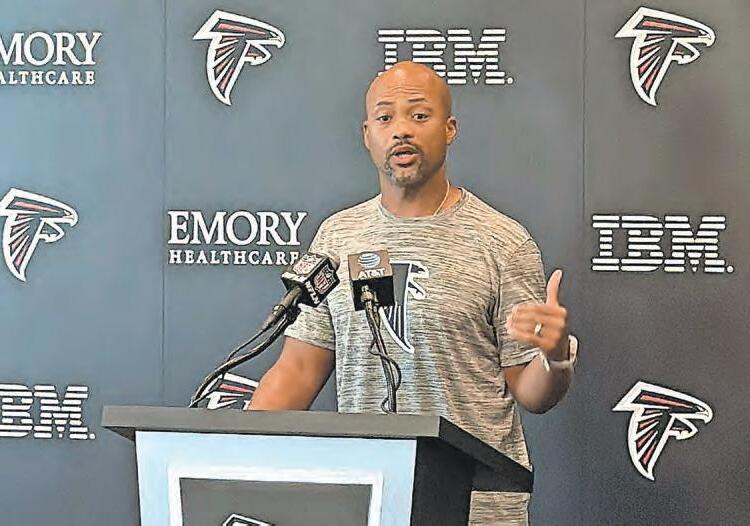
was well into his multiple Pro Bowl and future Pro Football Hall of Fame career, the last time the Falcons came into training camp with the playoffs as an expected goal. Now retired and a studio analyst for CBS, Ryan and his twin sons walked around the sidelines during training camp on Sunday.
The cast of The Pivot podcast was also in Flowery Branch. A popular podcast that features former NFL players, former Pittsburgh Steelers free safety Ryan Clark is one of the show’s stars. Clark greeted Falcons head coach Raheem Morris with a bear hug and proceeded to walk on and off the field while a camera crew followed him and his co-hosts around the sidelines.
The energy around the Falcons’ training camp is different this season. Although the fans are back following renovations to the training facility and field, Atlanta is the focus of at least one of the preseason spotlights.
The spotlight got brighter as a couple of what can best be described as skirmishes broke out during offensive/defensive run-throughs.
Rookie defensive end James Pearce, Jr., a firstround pick expected to play immediately, was involved in both of those disturbances. One of those occasions was with offensive line mainstay Kaleb McGary. High temperatures in the


air and on the field are to be expected when there are so many for a defense that finished in the bottom five in sacks last year.
The offensive line, arguably, had the best season of all the Falcons’ position rooms last year. They have the right to be cocky. Veteran lineman Chris Lindstrom could be heard saying “First down” and “Kick some a&%” when the second string line was on the field and he and the starting unit were taking a break.
Fontenot complimented running back Tyler Allgeier and tight end Kyle Pitts for both coming into camp with positive attitudes about their places on this team.
Fontenot said, “We love where Kyle is right now,” and “Tyler is a four-down player.”
On the newly acquired linebacker, Divine Deablo, Fontenot spoke highly of his size and speed at the position, saying how excited the coaching staff is about adding him to the linebacker corps.
“This dude is a really good player,” Fontenot said. “We’re very excited about him. We feel really good not just at the linebacker position. We have some really good players.”
One of those presumed good players is second-year outside linebacker Bralen Trice. The 24-year-old former University of Washington
and 2024 third-round pick missed his rookie year due to injury. Trice says he is “back to 100%” and credited his wife for keeping his spirits up during rehab and throughout the season. Trice can only add to the defensive players that the Falcons, Fontenot, Morris, and first-year defensive coordinator Jeff Ulbrich will use to end the playoff absence streak.
“We’re excited about where we are as a team,” Fontenot said.
By DENNIS MALCOLM ByRON AKA ALE SHARPTON
KIA continues to step up their game, and their sporty sedans like the midsize K5 are helping lead the way. This time around, it’s the all-new 2025 Kia K4 entering the compact sedan market with the same intentions. Presented in five trims—LX, LXS, EX, GT-Line, and GT-Line Turbo—I was excited for the introduction. The GT-Line embellished with the Premium Package ($1,100) was first up, and left me with a positive impression regarding design, space, technology, and value starting at $25K for the second most opulent version.
The GT-Line pulls up born with confidence, boasting a captivating “Morning Haze” exterior, which uniquely changes to either a slate gray, sage green, or light blue depending on how the light hits it. The futuristic LED lighting package, 18-inch alloy wheels, gloss black exterior accents, and optional Sunroof Package ($900) complete with a sunshade further accentuate the curvaceous exterior. Regarding performance, the 2.0-liter, four-cylinder engine paired with an Intelligent Variable Automatic Transmission delivers smooth acceleration, adequate responsiveness resulting in 147HP and 132 lb.-ft of torque, and a wallet-friendly 33 miles-per-gallon average. I appreciated the different drive modes and went with my favorite driving style, Sport, to fully utilize the sport-tuned multi-link rear suspension, handling and overall performance.
Inside, the roomy cabin combines cloth and SynTex seating materials that come with the Premium option are comfortable and soft to the touch. The GT-Line is generous when it comes to amenities, boasting a sport steering wheel with paddle shifters; heated and ventilated front seats; and dual-zone automatic climate control. The rear gets 60/40 split-folding rear seats and a center armrest with cupholders to bring a chauffeur-like experience especially for long excursions.
On the tech side, KIA’s expansive list of features includes a user-friendly 12.3-inch touchscreen display with navigation, and seamless Wireless Android Auto/Apple CarPlay compatibility. The Premium Package blesses ears with a Harman/Kardon premium audio system and aforementioned sunroof that makes the cabin feel airy.
This carmaker doesn’t shy away from safety, easing the mind with a plethora of advanced safety features. The forward collision-avoidance assist (cyclist and junction turning); blind-spot collision-avoidance assist; rear cross-traffic collision-avoidance assist; and smart cruise control make any journey a confident one.
Ultimately, the birth of the 2025 K4 GT-Line is an ideal choice for first-car owners, families who wish to stay on the frugal side yet demand the most bang for their buck. Stylish, loaded with tech, plus limited trips to the gas station thanks to the sedan’s efficiency will make considering this new addition to the KIA lineup a lot easier. Keep an eye on the K4 hatchback coming in ’26 as well.
Fuel Economy: 29 MPG city/39 highway/33 combined
Price: Including both the Sunroof and Premium Packages is $27,190
For more information, visit Kia.com.

Spacious





FULTON COUNTY ADVERTISEMENT FOR BIDS
Bid Solicitation for 25ITB1420569A-ST Sewer Line Chemical Root Control Services for Fulton County Public Works will be accepted online through BidNet Direct on Tuesday, August 26, 2025. All Bidssubmitted must be received no later than 11:00 a.m. local (Eastern) time on the stated date. https://www.bidnetdirect.com/georgia/ fultoncounty
SCOPE OF WORK: Fulton County, Georgia (“County”) The purpose of the project specified herein is to apply a chemical root control agent to sanitary sewers, in order to kill the root growth present in the lines and to inhibit re- growth, without permanently damaging the vegetation producing the roots. The terminology related to the chemical product shall be herbicide rather than pesticide pursuant to federal and state law. The chemical root control product being used by the contractor must meet all qualifying criteria. All licenses and certifications shall be designated accordingly.
The detailed scope of work and technical specifications is outlined in the Scope of Work, Section 4 of this proposal document.
In order to obtain complete information about this solicitation, please click the link below where this document and supporting documents can be downloaded, https://www.bidnetdirect.com/georgia/fultoncounty
FEE: N/A
CONTRACT TERM: 1 Year with (2) One-Year Renewal Options.
PRE-BID CONFERENCE: will be held virtually online via a Zoom Conference on Tuesday, August 12, 2025 at 10:00 A.M. to provide bidder(s) with information regarding this project and to address any questions.
Join Zoom Link: https://zoom.us/j/99497275035?pwd=4jw2dLqcfwVvCWv2rYavtBALLidr 3b.1
Meeting ID: 994 9727 5035 Passcode: 811802
If you have any questions regarding this project please contact Shondra Turner, APA, (404) 612- 1100 or Email: shondra.turner@ fultoncountyga.gov. Fulton County reserves the right to accept or reject any and all applications and to waive technicalities.
for The Fifty-Five, located at 2855 East Point Street, East Point, GA BIDS DUE: August 19, 2025, at 2:00pm
PRE-BID MEETING will be held on site on July 24, 2025, at 10:00 am
PLANS: Hard Copies of plans available upon request and at subcontractor’s expense from A1 BluePrint, (404) 524-8881 or a1blue.com OR for a link contact Linda at Lstache@gormanusa.com.
Contact Info: Linda Stache, Gorman & Company, Phone: 608-835-5177, Fax: 608-835-3667
CERTIFICATIONS: SBE / MBE / WBE / EBE / DBE / VBE
Please note: This is a prevailing wage rate project.
CUSTOMER CONTACT SPECIALIST
MANA ACCOUNTING SERVICES: Mana Accounting Services seeks a Customer Contact Specialist in Atlanta, GA. Duties include marketing, securing leads, managing client relationships, onboarding, retention, responding to client inquiries, and ensuring high customer satisfaction. Bachelor’s degree in Financial Administration or related field and 3-5 years of relevant experience required. Send résumé and cover letter to: mayra@manaaccounting.com.